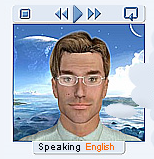Paco visits Scotland and Wales: Socializing in Cardiff
Introduction
Verbs in all languages can be followed by other verbs. Look at these examples:
Me gusta leer libros de aventuras. (the verb "gusta" is followed by an infinitive).
In Spanish, the most common situation is when verbs are followed by an infinitive, as in the example. But in English, they can be followed by other verbs in infinitive (with or without 'to'), by gerunds or by both.
In this topic, you are going to learn which verbs are followed by an infinitive with 'to', which ones are followed by gerunds, and which ones can be followed by both of them.
You will also learn about three English diphthongs: /aɪ/, /ɛɪ/ and /ɔɪ/.
Concerning vocabulary, you are going to learn words and phrases related to education, literature and the cinema.
Remember! When you need to know the pronunciation of any word or phrase, or if you want to practice pronunciation, write something under our robot and she will pronounce it for you.

|
| Click here to ask Mike |
 |
|
By BobTheCorkDwarf C.Commons
|
Paco is enjoying his stay in Cardiff. He has seen most of the city and now he wants to enjoy the people and their customs. He phoned his friend Paul, the student he met in Edinburgh, and they have decided to meet for lunch. Paul is very friendly and, as a student of Spanish at university, he is very interested in everything Paco talks about. He likes the Spanish culture and wants to learn as much as possible. He's been busy doing some assignments from university but now that he has handed them in, he is much freer.
They like each other very much and they are planning to do many things together. Paul would like Paco to meet his friends, and Paco suggests going to a rugby match since it is the most popular sport in Wales and he is interested in all kinds of sport. When he visited the Millennium Stadium, he realized the Welsh National Team was playing an international match the following weekend.
Paco is very excited about all these plans. He gets ready and leaves the hotel on the way to the pub.
Verdadero Falso
Verdadero Falso
Verdadero Falso